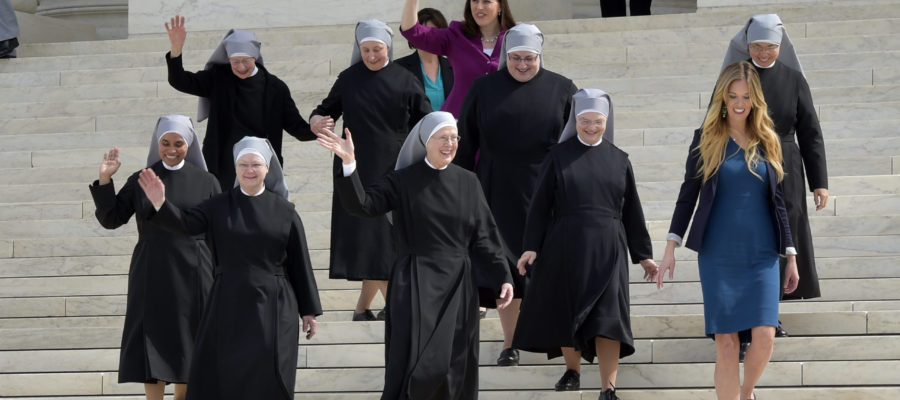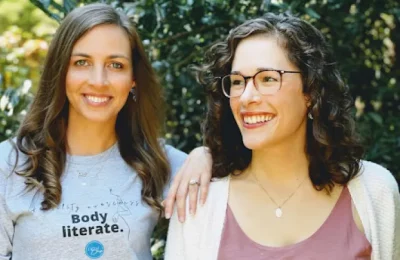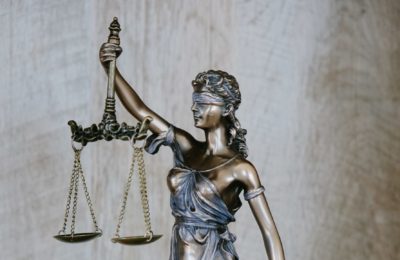Stick to your Knitting?
May 7, 2020 | Published first in St. Lawrence Institute for Faith and Culture
Today, the Little Sisters of the Poor returned to the Supreme Court to defend their right to serve the elderly poor, free of the government’s mandate to provide contraception coverage to their employees. For lawyers, Supreme Court enthusiasts, and regular citizens alike, this week marked a historic moment in that the Court heard oral argument via teleconference (allowing Justice Ginsburg to participate from a hospital bed) and the argument was made available live to the public.
Based on the questions posed during oral argument, the resolution of the case seems likely to turn on questions involving the HHS’ statutory authority under the Affordable Care Act to allow religious exemptions, rather than the scope of religious liberty.
But, there was discussion of the Little Sisters’ religious and moral convictions, so deeply held that they have carried on this fight for seven years and have never compromised them. The government’s position (that the Little Sisters must provide contraceptive coverage) is animated by the belief that contraception and abortion constitute preventative care, and that women need access to them in order to participate meaningfully in public life. In a question-turned-oration, Justice Ginsburg made an impassioned plea on behalf of women: women, she said, need access to seamless, no-cost contraception. To accommodate the religious beliefs of the Little Sisters would constitute a complete abandonment of women, leaving them to their own resources to find contraception at their own cost.
I hope to return, in a future post, to Justice Ginsburg’s anemic view of women’s dignity and agency. Today, I wanted to draw attention to one small exchange during the oral argument in which Justice Alito asked what the Little Sisters of the Poor would do if they lost the case and were required to provide coverage. Paul Clement, the Little Sisters’ legal counsel, stated that since providing contraceptive coverage violates the Sisters’ sincerely held religious beliefs, they would have to reconfigure their operations. He noted, with irony, that the government’s position would permit exemptions for religious orders that “stick to their knitting” (i.e., that engage in merely private worship or only serve people who share their faith) but not those that, like the Little Sisters, go out and serve others, of whatever faith. The Little Sisters are committed to living out their mission to serve the elderly poor, in fidelity to their own beliefs, come what may.
In the IFC course entitled, “Who is My Neighbor?”, we tackle thorny questions like the respective roles played by the church and the political community in promoting and protecting the common good. According to Catholic social teaching, the Church contributes to the common good through its own institutional mission as well as by providing formation to citizens who carry out that mission in the world through their own vocations. As the Council Fathers of the Second Vatican Council stated, “the force which the Church can inject into the modern society of man consists in that faith and charity put into vital practice, not in any external dominion exercised by merely human means.” (Gaudium et spes, no. 42)
By and large, our nation’s history and tradition are marked by ordinary, religious people putting that faith “into vital practice” in the public square. And our laws, and the exemptions to them, reflect that respectful balance we have tried to strike in our pluralistic society.
Since its inception, people of faith have found refuge in, built up, and served this great nation. Our country is a place in which people of faith, motivated by their faith, have contributed to the common good in countless ways, whether through the foundation of orphanages, hospitals, schools, and ministries to alleviate the suffering of the poor to such counter-cultural political and moral struggles as the abolitionist, the civil rights, or the pro-life movements. Our law has embodied this tradition by protecting religious practices in the public square such as the choice of religious education, exemptions from generally applicable laws (like exemptions from the draft for Quakers, or from compulsory high school education for the Amish, or for prison workers from participation in executions), employment protection for those with dietary restrictions or that wear particular forms of dress, and other forms of public witness.
This robust protection of religious practice benefits the common good, as the Founders realized. Our first president, George Washington, said in his Farewell Address: “[O]f all the dispositions and habits which lead to political prosperity, religion and morality are indispensable supports. In vain would that man claim the tribute of patriotism, who should labor to subvert these [two] great pillars of human happiness, these firmest props of the duties of men and citizens.”
In light of these principles, we should be grateful to the Little Sisters of the Poor for modeling well three realities. First, to flourish as women, we need not succumb to Justice Ginsburg’s view that contraception (and abortion) access is integral to our ability to participate in public life. Second, to be good American citizens, we need not hide or privatize our religious convictions or beliefs, even if they are unpopular. And, finally, to exercise the Catholic faith, we are to go forth and live the mission of the Church in the world.
A life devoted to the service and care of the vulnerable poor embodies the best of what it means to be a woman, an American, and a Catholic. Thank you, Little Sisters of the Poor, for living such a witness and persevering in it.
Copyright 2020 St. Lawrence Institute for Faith and Culture. All rights reserved. Reprinted with permission.
Image: Becket Fund.


